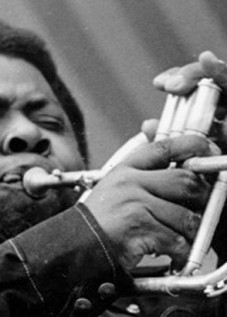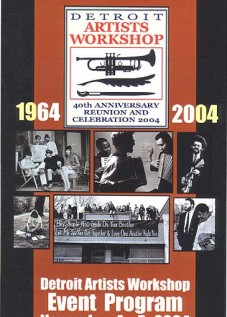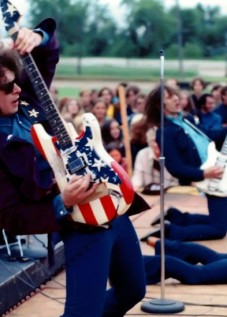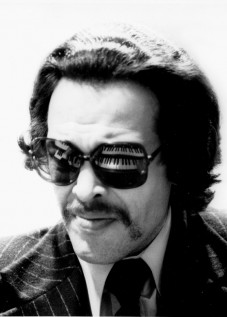Saturday Night Special: Lyman Woodard & Ron English Interview
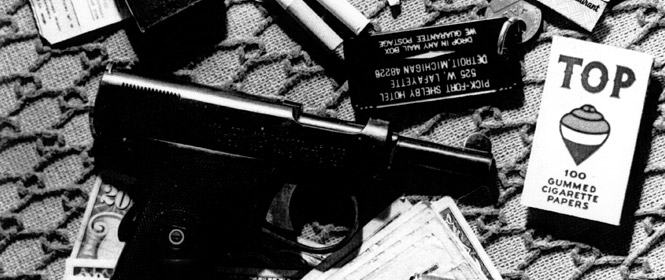
The “Equalizers” -Saturday Night Special photo by Leni Sinclair, art direction, John Sinclair. 1975
The Sound of Detroit is the sound of a city on the move – from the narrow neighborhood streets to Woodward and the Boulevard, from Davison to the Chrysler to the Edsel Ford and John Lodge Expressways, into the city and out to the suburbs or the factories. Detroit is the crossroads where native energy meets the industrial crunch, and the music this city has produced is known the world over for its intensity and drive.
Through the years the Motor City aesthetic has been embodied in the work of musicians as widely various as John Lee Lee Hooker, Aretha Franklin, Smokey Robinson. Bob Seger, Donald Byrd, Yusef Lateef, Elvin Jones, Martha Reeves and the MC5. With the departure of Motown Records to Los Angeles a number of years ago, however, the Detroit music scene was vacuumized. Yet through the last few years, a new scene has emerged, most particularly evident in the creative works emanating rom two artist-controlled record companies, Tribe and Strata.
One of the Strata groups has just released a fine album which could help regain Detroit ‘s musical recognition in a current sense. “Saturdav Night Special” is the first release by the Lyman Woodard Organization, currently being heard on WJZZ in Detroit, WCBN in Ann Arbor and a number of other stations. Upon the occasion of the lp’s release, the SUN took this opportunity to talk with the two principal partners in the Organization – organist Lyman Woodard and guitarist Ron English, who formed the band in late 1973. Now in their early 30’s and veterans of fifteen years apiece in the Michigan creative music community – including the Artist’s Workshop of 1964-66 and the latter days of Motown and Holland-Dozier-Holland – Lyman and Ron have settled into an exciting group format with drummer George Davidson, percussionist Lorenzo Brown, and the truly amazing young alto saxophonist Norma Bell (who recently took a sabbatical from the LWO to join the Mahavishnu Orchestra for its current U.S. tour).
The SUN interview was conducted by Bill Adler and John Sinclair.
SUN: Do you want to start with some early history?
Lyman: Well, Ron and I have known each other for quite a number of years. We first played together, I think, in a nightclub in Lansing that featured dancers, artistes – you know – back in 1961 or 62.
SUN: Did you go to college or anything?
Lyman: I went to Flint Junior College for about a year and a half, and then I took a six-month course at Oscar Peterson’s School of Jazz, in Toronto. The Advanced School of Contemporary Music, it was called. Oscar actually gave each piano student private lessons. It was an invaluable experience. Before that I was into a very limited Chuck Berry-oriented, Little Richard kind of a background with very little understanding.
SUN: Did you play at high school dances?
Lyman: Most of the bands we played with worked in bars in Lansing starting around 1960. But it was kind of a sorry crowd of people – a bunch of alkies, lushes. Very crude vulgar people, that’s what the crowd was like at those places. Their main purpose was to get stoned: completely drunk, dangerously drunk in some cases. At that time in the locale of Flint there were some musical things happening, you know, but Flint’s a really strange city in many respects. After that I moved to Jackson and started gigging with (tenor saxophonist) Benny Poole, and we played in some places that were basically juke joints out in the middle of the woods, like the Woods Club for example.
SUN: So when you played in Flint you played mostly to white audiences and when you went out to Jackson you were playing to mostly all black crowds?
Lyman: Right. Well, black and white. We were playing some pretty hip jazz lounges too, in Jackson, and in Lansing, and all around the “Organ-Tenor Belt of America,” which is what I call it.
SUN: During all this time when a lot of musicians were feeling the call to go to New York City, a lot of things were happening for you right where you were. You never felt any compulsion to go to New York at all?
Lyman: Well, that used to be kind of like what everyone did, I guess, but I never really felt the desire. I didn’t think that the atmosphere or the environment would be more active than it has been right here. Then a lot of us became involved in the Artists’ Workshop, after I had moved to Detroit around 1964, and we were all working in a structure which gave us the opportunity to observe each other’s work and to work out a lot of creative ideas which we could do while we were still playing gigs in the organ-tenor thing to make a living. So it was very worthwhile.
Ron: I think the significant thing, bearing in on what you’re trying to get at, is that all of us really represent a decision that we all made in our own ways to not go to New York and not go to San Francisco or L.A. or Europe and just to stay, you know, why go through all those changes and uproot ourselves when we’ve got a lot of friends here, we’re all into something, we might as well do something together here, where we already are. So you get to a point like now, where people have worked over a period of years – ten, fifteen years – to get to do what they wanted to I do. “Self-determination,” if you want to call it that, In the simplest sense. That’s the beautiful thing about it to me, I would say.
Lyman: And the Artists’ Workshop was really based in having a basic principle of localism, you know, “here’s where we are, this is where we live and this is what we’re doing” – and it’s valid, it relates to what the Jazz Composers’ Guild was doing in New York City, and the AACM (an artist-controlled cooperative) in Chicago related to what they were doing and to what we were I doing in Detroit, and I the whole thing influenced other people over the years. That was ten years ago, and now we are seeing a real flowering of a lot of the ideas that were coming out then, here in a particular way but all over the country as well. It’s really all about identifying your own vision of what experience and art are about and doing what it is you think should be done – and enjoying yourself in the process. So you do it however it is you have to do it in order to keep on doing it.
SUN: Didn’t both of you get involved in the Motown scene quite extensively after the Artists’ Workshop period?
Lyman: Right, both Ron and I were on the road with several different groups.
Ron: I did a couple of things with Martha Reeves, but I did work quite a bit with the Four Tops and had the great pleasure of working with Gladys Knight and the Pips on some occasions, like here in Ann Arbor at Crisler Arena last year.
Lyman: I worked with a group called the Undisputed Truth, a Motown band which had a big hit with “Smiling Faces.” It was a Norman Whitfield production, and he was also the manager of the group. Then I worked with Martha Reeves and the Vandellas, and was Martha’s musical director for some time. l’m sure that influenced a lot of my music – we played all of Martha’s charts, so many of her tunes, over and over, when I was on the road with her, and it couldn’t help but influence our whole musical direction.
SUN: Why not talk about the new album . . .
Ron: What I think is interesting about the album s that the song titles and the different moods that are reflected, you know, have to do with just being here, in this place, but especially with just being on . . .
SUN: Are you talking about Detroit?
Ron: Being on one fast track or another or trying to get off one track or another, you dig, so the titles of the tunes have to do with “Saturday Night Special” and “Joy Road,” which is this beautiful, elegy-like tune written by Lyman, or “On Your Mind” and “Help Me Get Away,” which are my tunes.
SUN: Is that a major Detroit theme that you picked? “Help Me Get Away?”
Ron: Right. Actually that tune is something funky in five-four time, and it actually sounds like a hillbilly tune, you know, a country-and-western
oriented kind of tune with a very funky edge to it. But it’s right in that pocket in terms of its feeling, and it’s also the last tune on the album.
Lyman: And in the same vein there’s “Cheeba,” which s a tune with an esoteric kind of underground drug reference. However, I hate to classify your regular very top grade reefer as a drug because it’s quite organic, really.
Ron: It’s an herb which is quite natural – natural in its origin and widespread in its dispersion.
SUN: Right!
Lyman: So “Cheeba” s a reference to that particular state of mind which is related to that particular herbal substance. The entire tune had been on an earlier album I had done with the Eighth Day, a group that was affiliated with the now-defunct Holland-Dozier-Holland production company. Tony Newton, the leader of the group, has just joined Tony Williams’ new band, incidentally. The title tune, “Saturday Night Special,” is of course the most direct expression of what we were talking about before. It has some mellotron string parts that give what is actually a funky, boogie-type motif against a kind of satin, silky background, which has always been symbolic to me of the mythical silky, satiny style of living which is part of that “fast track” Ron was talking about. It’s like the dichotomy of a hit-man, you know, maybe hitting a dope czar who has the golden opportunity to die in his Fleetwood Brougham with the velvet seats and the silk-lined trunk compartment, right? It’s like embroidering your own tomb or your own casket, in a way. It’s like a concept of living so fast, so close to the edge, and maintaining that as a way of life. You know what I mean, with all the complications, the lawyers, the police, you know, just trying to maintain that dangerous life-style without just going completely crazy. That’s a reality and not one that I really know that much about, but the whole concept of the tune it to try to evoke that dichotomy, in music. Also, in that same tune, the bridge has got a Motown oriented harmony structure to it, which also gives it a certain particular locale reference too.
SUN: Well, it’s certainly hard to avoid the Motown influence living in Detroit, anyway.
Lyman: Oh indeed, it’s beautiful music that came out of that particular creative environment. Musically, of course, it was a tremendous influence on us, as we were saying, but we should also talk about the music of Charles Mingus in the same context, because that was just as powerful to me in terms of shaping my own conception – particularly Mingus’ variety and his daring use of form. I think Eric Dolphy, who of course played with Mingus for some time, was another major inspiration for me, from a soloing or playing perspective, as an example of what the several harmony
alternatives there are in, you know, any improvisational process. I think people are starting to look to improvisational jazz again for interesting musical work. There’s something personal about it, something unformulated compared to the handful of things the radio is pushing.
SUN: Would you like to say anything in particular in closing?
Lyman: Yes, I think people starting to look to jazz again is a good sign. I think that people are tired of rock as the only thing that’s happening, although the kids that are coming up now haven’t been given much of an alternative to the AM Top 40 thing and the FM “progressive rock” thing. And when they hear jazz, or improvisational music, when they really hear it, then they just love it. There’s something that’s personal about it, something that isn’t formulated so much, that hasn’t been used over and over again. It’s a personal form of expression, and I think people are really desperately ready for some imaginative musical approach. I think that’s why people are listening to Miles and the other groups that are starting to emerge more and more rapidly. They’re ready for it. They’re tired of the old formulas hammering at them all the time. There’s just a handful of things the radio is pushing, and they keep playing the same stuff over and over, just like commercials. They are commercials, and the only alternative is to turn them off and turn on to something different, as long as it relates to where people are at in their daily lives. That’s what we were trying to do with Saturday Night Special, and we just hoping people will get something out of it they can use. That would make us very happy, l’d say.
Source: Ann Arbor Sun, May 23rd, 1975
Tags: Interview, Jazz, Lyman Woodard, Ron English, Saturday Night Special



